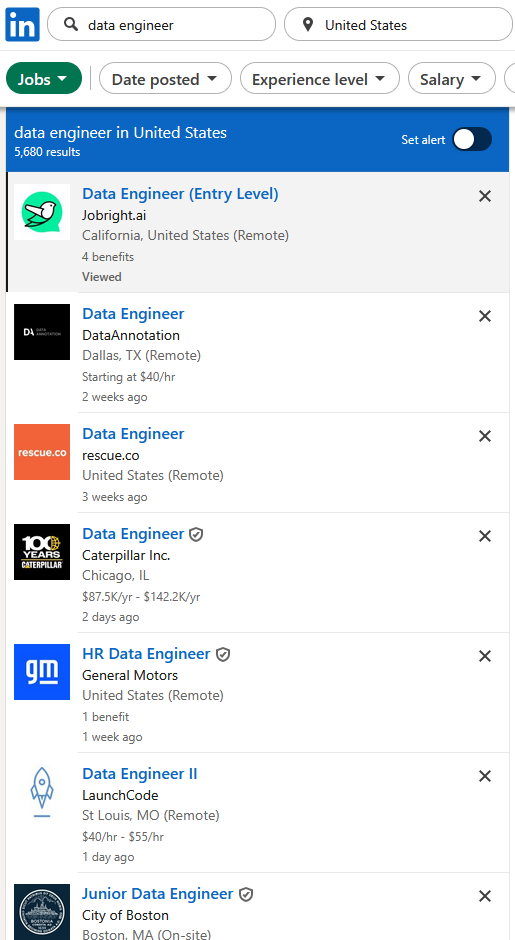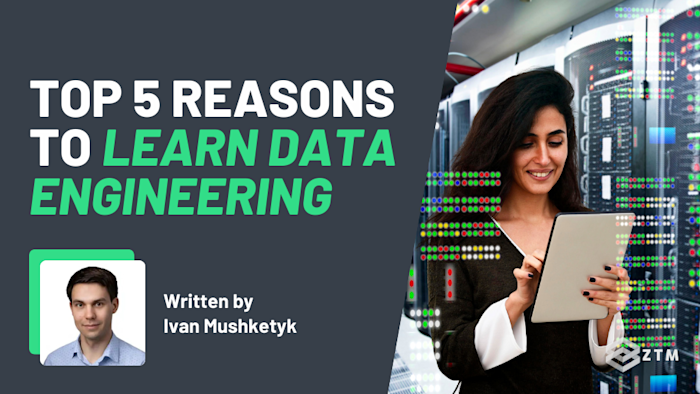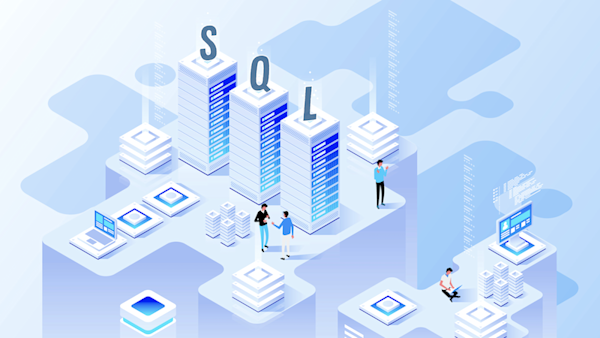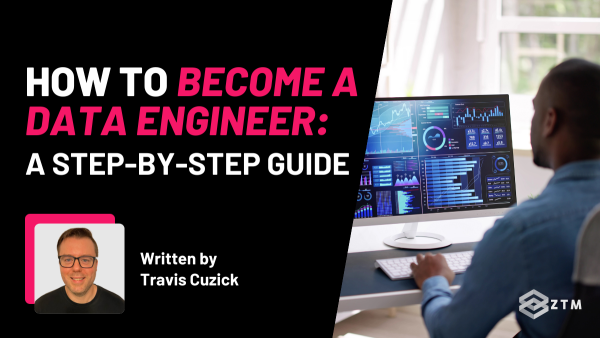You’ve probably heard the term “Data Engineering” pop up more often in the last year or two. It’s showing up in job boards, career newsletters, and was one of the highest demanded courses from our community of over 500,000 tech professionals.
But why is everyone talking about it, and more importantly, should you actually learn it? (Spoiler alert but yeah, you probably should).
In this guide, I’ll walk you through the top reasons #4 why Data Engineering is becoming one of the smartest skills you can learn this year.
So let’s get into it.
Reason #1. The Data Engineering industry is growing incredibly fast
Unless you’ve been living under a rock, you’ve no doubt seen the huge growth in the AI industry.
However, the thing that most people don’t realize is that for AI to work, it needs reliable data flowing in the background, and that’s where Data Engineers come in. It's their job is to build the systems that collect, clean, and move data so it’s ready for real use.
That might mean combining data from sales tools, customer platforms, and internal databases, or simply transforming that data into the right format so a machine learning model can use it. Otherwise models break, results are skewed, and teams waste time hunting down missing values or trying to stitch together broken pipelines.
For example
OpenAI’s model training pipelines rely on massive datasets with literally hundreds of terabytes of text, code, and media. This is why Data engineers at OpenAI use distributed tools like Apache Spark and Ray to clean, transform, and stream that data into usable training batches. Without that infrastructure, the models couldn’t be trained
Spotify’s personalized playlists like Discover Weekly are driven by billions of user interactions. Data engineers use tools like Apache Beam and BigQuery to pull and process listening history so that recommendations can feel personal, even in real time
Airbnb’s dynamic pricing and search ranking systems are powered by live data from bookings, events, and customer behavior. Their engineers use Airflow and Spark to combine and transform data across platforms, so their models always have fresh, clean input
This is why companies are hiring more Data Engineers right now, and why it’s being talked about so much.
It’s not just hype either. The global market for big data and data engineering services was valued at around $51.8 billion in 2024 and is projected to reach approximately , with a CAGR of about 13.3% during that time frame.
This is why everyone is talking about the role, and why companies are willing to pay big bucks to get Data Engineers on their team.
Speaking of which…
Reason #2. Data Engineering pays very well
According to Glassdoor, the average salary for a Data Engineer in the U.S. is , with top earners making well over $200,000, especially in major tech hubs like San Francisco or Seattle.
The thing is though, even entry level Data Engineers start out around $83,000 to $134,000 per year!

Not bad right, but it gets better.
Reason #3. The job market continues to expand
You would think that with such a high salary these jobs would be super competitive, but the reality is that the demand far outweighs the number of trained Data Engineers in the market.

(And that's just one platform!)
Add in the fact that the global demand for Data Engineering is forecast to grow at a compound annual rate of over 30% for the next several years, and we have literally thousands more jobs coming down the pipeline (no pun intended).
Because it's not just AI that needs Data Engineers, but also industries like healthcare, retail, finance, education, and logistics. They all rely on clean, reliable data, and they all need the infrastructure to manage it.
And that’s where you come in.
You just need to pick up the right skills…
Reason #4. You don’t need to be great at math or have a CS degree to become a Data Engineer
One of the biggest misconceptions about data roles is that you need to be some kind of math genius to qualify. And sure, you might need some math for Data Science or Machine Learning research, but it’s not true for Data Engineering.
Why?
Simply because Data Engineering is more about systems thinking than math.
It’s about understanding how data flows through a business:
Where it comes from
Where it’s going
What format it’s in
And how to make it useful
And yes, you need some technical skills but you don’t need a degree or to go to college to learn them. In fact, so many people in this industry are self taught or learned online via tutorials and digital courses.
So what kind of skills do you need?
You’ll need a base level of experience with tools like:
SQL for querying data
Then you’ll need Python for automating and transforming it
From there, you’ll need to learn more specific Data Engineering skills:
Apache Spark to process large real-world datasets at scale
AWS tools like S3, EMR, Glue, and Athena to build cloud-based data lakes
Apache Airflow to orchestrate data pipelines and run workflows automatically
BigQuery or Snowflake for storing and managing data in cloud data warehouses
Kafka and Flink to build real-time streaming systems
And finally, the ability to integrate AI and LLMs into your data pipelines
It might seem like a lot to learn but we teach all of this in just 3 courses here at Zero To Mastery inside of a single monthly membership.
You can start off with Python:
And then take my brand new Data Engineering course:
It teaches you everything you need to become a Data Engineer step-by-step.
So that by the time you’ve finished, you'll know how to build end-to-end, production-grade data systems using the most in demand tools and get hired ASAP.
Reason #5. These skills are useful even if you are not a Data Engineer
The final benefit that most people miss, is that you don’t have to become a full-time Data Engineer to get value from these skills - because they complement other tech fields!
For example
If you’re a backend or full-stack developer, then chances are pretty high that you already work with databases, APIs, or logs. And so knowing how to pull data from different sources and get it into the right format can save you hours and help your team move faster.
The same goes for Data Scientists and ML Engineers because clean data is everything. If your pipeline breaks or the input is messy, your model won’t work the way it’s supposed to. That’s why so many companies want people who understand how data flows, not just how to use it.
So even if you're not planning to fully move into a Data Engineering role, simply by learning these skills it will give you an edge in your current job.
What are you waiting for? Learn Data Engineering today!
As you can see, Data Engineering is a fantastic career to move into. It’s in high demand, pays extremely well, and the market is predicted to continue to grow for the next decade - thanks to its interaction with AI and data backed systems.
So whether you’re looking to level up your current role or make a full career pivot, there’s never been a better time to learn data engineering.
Get started and learn this skill today!
Best articles. Best resources. Only for ZTM subscribers.
If you enjoyed this post and want to get more like it in the future, subscribe below. By joining the ZTM community of over 100,000 developers you’ll receive Web Developer Monthly (the fastest growing monthly newsletter for developers) and other exclusive ZTM posts, opportunities and offers.
No spam ever, unsubscribe anytime





